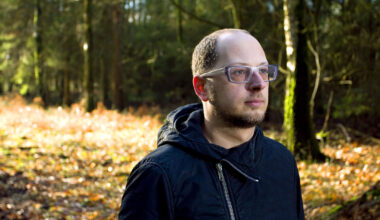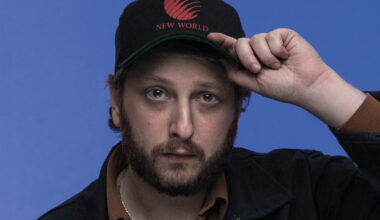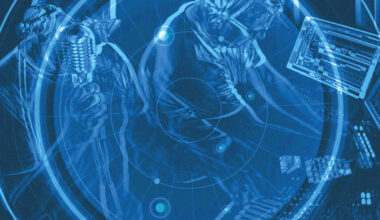Former Kraftwerk man Wolfgang Flür recalls a little of his life as a robot and looks forward to an altogether more human future with his ‘Eloquence – Complete Works’ album and his dramatic ‘Musik Soldat’ live show
Don’t mention Kraftwerk. I mentioned them once but I think I got away with it all right.
“My music has developed in a very different way to my former group,” says Wolfgang Flür. “What they present is something I would describe as minimalistic and cold, with themes about robots and computers and technical things and so on. But where they are minimalistic, I would say that I am maximalistic. I would say that Wolfgang doesn’t sound like Kraftwerk.”
‘Eloquence’, Wolfgang Flür’s first album under his own name and only his second since he left Kraftwerk in 1987, proves the point. It’s subtitled ‘Complete Works’ and it brings together material Wolfgang has recorded at various times, in various places, with various collaborators, going back over the last 15 years. It opens with the airy and playful ‘I Was A Robot’, which was also the title of his 2000 autobiography. The track begins with the lines, “Coming from the autobahn / I was a radioactive man / I slipped into a showroom dummy / Robot playing was quite funny”, demonstrating both his sense of humour and a human side that his “former group” often seem to lack.
“They have a special kind of a human side, I really can tell you that because I know them,” says Wolfgang. “But it’s not on the front, it’s more in the backyard, as I might say. They are all nice guys actually, especially Karl, but he’s the only one who is friendly with me. With the others, it’s not so good. Well, there’s only one left now, as we know, and he’s still fighting against me.”
Which is perhaps part of the reason why Wolfgang’s record company offer a bit of advice to journalists wanting to interview him. “He won’t talk about Kraftwerk,” they say. He will talk about Kraftwerk, as it goes. In fact, he talks about Kraftwerk a lot, just as you’d expect. Right now, though, he’s doing so with a degree of caution. He’s had one or two what you might call “difficulties” with Ralf Hütter in recent times.
“He doesn’t want people to call me ‘ex-Kraftwerk’ or to put ‘Wolfgang Flür, ex-Kraftwerk’ on records or posters,” explains Wolfgang. “He’s fought with lawyers against me, putting me into legal actions. It has sometimes been very disturbing for me.”
Of course, it’s generally been gig promoters, journalists and the like that have used the “ex-Kraftwerk” tag rather than Wolfgang himself. When he plays live now, he has to send promoters strict instructions on the size of the lettering they are allowed to use if they want to include Kraftwerk’s name on posters or in adverts. It’s all to do with ratios and percentages, but the bottom line is that it has to be kept quite small. Which seems daft given we’re talking about someone who was part of the band’s most famous line-up, the one that recorded all their classic albums, beginning with ‘Autobahn’ in 1974.
“Well, it’s up to him,” continues Wolfgang. “Maybe he’s a bit jealous that I do so many things now. When I left Kraftwerk, he thought I was lost from music. He thought, ‘He’s not dangerous’. I mean, I’m not dangerous anyhow, how could he think so? But when I released my ‘Time Pie’ album as Yamo with the guys from Mouse On Mars, a record that had some very interesting ideas, I would say he was not expecting that from the former drummer boy.”
How do you feel about your relationship with Ralf Hütter these days?
“It is sad. I would love it to be the other way, for us to be friends, you know.”
Do you think that’s still possible?
“I am always open. Why does he need a lawyer to make communications between us? He could call me. He has my number, he has my email. We’ve done that for 17 years, you know. My goodness. But this is not a thing that fills my mind for the whole day, I have to tell you. No, not at all.”
I must admit that I find it hard to imagine anyone falling out with Wolfgang Flür. He’s a real charmer and he’s terrific company, as I first discovered earlier this year when he took part in a fascinating debate with Andy McCluskey from OMD and Stephen Mallinder from Cabaret Voltaire hosted by Electronic Sound in Norwich. I spent quite a lot of time with Wolfgang that weekend and ended up driving him and his wife, author and film-maker Zuhal Korkmaz, from Norwich to Heathrow, to catch their flight back home to Germany.
Hard to believe maybe, but Wolfgang is edging towards his 70th birthday. He was born in Frankfurt in 1947, a couple of years after the end of the Second World War. His father was an optician and Herr Flür’s work took the family to Koblenz a short time later, then to Düsseldorf in the early 1950s. Wolfgang has lived in Düsseldorf ever since, but he and his twin brother Winfried didn’t think much of the city to begin with.
“Koblenz is in the wine hills, at the crossroads of the Rhine and the Mosel, and we were surrounded by nature there,” recalls Wolfgang. “My brother and I lived outside all the time, in the greenery, on the banks of the river. It was a perfect place to be a child, a kind of romantic place, and this had a big impact on me, on my personality. But when we came to Düsseldorf, we lived on a street with lots of traffic. It was loud and we couldn’t play outside as we were used to. We had no nature near to us and we had no playground either. We didn’t like it at all.
“My thoughts about the city changed as I grew older. I heard The Beatles and everything was different after this. I was learning English at school by this point, I was 15 or 16 years old, and my introduction to English culture was through an English teacher who had the longest legs and wore the shortest miniskirts you can imagine. She was fantastically sexy and everything suddenly seemed so modern, you know, with the fashion and the pop music and so on. We would listen to Radio Luxembourg every Saturday to hear the Top 10 pop records from England and we started to hear other groups like The Kinks and The Rolling Stones. We had nothing in Germany like these. All we had was schlager music and we hated schlager because it was our parents’ music.”
A couple of years down the line, Wolfgang formed a Beatles covers band called The Beathovens, who became very popular in the Düsseldorf region. On one occasion, they even supported The Who.
“Can you believe that? It was in a big concert hall, but I don’t think I was aware of how famous they were before we played the gig. Watching them destroying their instruments was quite shocking to a lot of people.”
By the time the 1970s rolled in, The Beathovens were long gone. But where they had led, many others followed – from Kraftwerk and Neu! to DAF, Die Krupps, Die Toten Hosen, Liaisons Dangereuses, Der Plan and beyond – each taking their own idiosyncratic path. I ask Wolfgang if he has any theories about why Düsseldorf produced so many great bands during the 1970s and 1980s.
“This has always been a place of the arts and a place of money. Some of the people were like Ralf and Florian, they came from families where it was not difficult to get 8,000 marks to buy a synthesiser in 1973. It’s also a place where there are good schools and good universities, so lots of students, and we have a big fashion fair here too. I think this is all part of what was a kind of melting pot for kids with different artistic talents. I remember there were special cafes where the high fashion models and photographers have their meeting points. When I was with Kraftwerk, we used to hang around those places too, but I have to say that the models didn’t even look at us when we came in with our black clothes and our racing bicycles to order our pieces of cake.”

How aware were you of the other Düsseldorf bands at that time?
“Not so much. I personally knew only a few of them. I knew Robert Görl from DAF a little bit, for instance. We were quite distant from what was happening because we were away on tour a lot and, if I’m honest, I think we were also too arrogant to listen to other music. Punk was massive here and it was centred on a club called the Ratinger Hof. I went there a few times and I was hit by one of the punks once because they were jealous of us, they didn’t like that we were famous and we had money and Florian was driving around the city in his huge Mercedes 600. But it wasn’t just us. Everyone was jealous of everyone else. Everyone wanted to be unique, so there really wasn’t any co-operation between any of the groups.”
There are two things that I particularly remember about my road trip from Norwich to Heathrow with Wolfgang and Zuhal earlier in the year. The first was my urge to sing “Wir fahren fahren fahren auf der Autobahn” at the top of my voice as we whizzed down the M11. Thankfully, I managed to resist that.
The second thing I remember was Wolfgang’s concern for the safety of his small travel case, a somewhat battered but still elegant gold coloured aluminium number. He told me that it was made by Zero Halliburton, who also make the briefcase in which the President of the United States carries the launch codes for America’s nuclear weapons when he’s on his travels. You can see Wolfgang’s case for yourself on the cover of ‘Eloquence’.
“The idea to put it on the album cover came from my good friend Markus Luigs, who is a photographer and a graphic designer, and it represents a connection to my past, but not in an obvious way,” notes Wolfgang. “I bought the case on Fifth Avenue on my first visit to New York with Kraftwerk in 1975. Florian already had one like this, so I have to say that I imitated him. It is a special design and we liked it very much. I travelled with it always after this and it has a lot of symbolism for me when I think of all the places that my case and I have seen together and all the people we have met.”
Was the case expensive?
“Yes. It was $700.”
I tell him he could have probably bought a car for that amount of money in 1975.
“A small one perhaps, a used car perhaps,” he chuckles before straightening his face in mock seriousness. “But I had a car at home already. I didn’t need a car. I needed a suitcase.”
The notion of a well-travelled man is reflected in ‘Eloquence’. The album is a collection of smart electronic pop songs – sleek and sharp, peppered with melodic hooks, bumped along by toe-tapping beats – with a discernible global vibe to many of the tracks. There are lyrics in English, German and Japanese (just like Kraftwerk, then), with contributions from the likes of Maki Nomiya, formerly of Tokyo popsters Pizzicato Five, and Mexican electronic composer Ramón Amezcua, a member of the innovative Nortec Collective. Other collaborators include Nitzer Ebb’s Bon Harris, Meat Beat Manifesto man Jack Dangers, and Marc Almond’s long-time associate Anni Hogan. Many of these artists Wolfgang has met in the last few years, during which time he has been touring his much-praised ‘Musik Soldat’ performances, more about which in a moment.
“When I travelled with Kraftwerk, I lived in a golden cage, if you know what I mean,” he says. “The openness that I have now is wonderful. To go to Mexico City, for instance, to play with Ramón Amezcua at a festival with 60,000 people, that is such fun for me. The Nortec Collective are making a connection between electronics and traditional Mexican music, which is an interesting mix, and I like Ramon very much. He is a nice, nice man. He is a small man, very fine, very educated, and he has the whitest teeth in Mexico. Before he was a musician, he was a dentist. He made a lot of money giving new teeth to pop stars from America.”
The collaboration with Ramón Amezcua is the brass-tinged ‘Moda Makina’, the spoken lyrics of which take inspiration from the fashion industry. In a not dissimilar vein is ‘Cover Girl’, a glorious synthpop track which Wolfgang describes as a continuation of Kraftwerk’s ‘The Model’.
“I thought the story of ‘The Model’ should go on,” he explains. “We have it in the movies, we had ‘Jaws II’ and ‘Jaws III’, so why not in music? Unfortunately, it’s not going so well for her now, though. It’s not going well for the girl in ‘Moda Makina’ either. The lyrics are about being on the road and going to a motel which has a little bar and a dance platform, and suddenly I meet an old friend of mine from Düsseldorf, a very famous model, but her career is over, she’s on the way down, so now she’s dancing for money in this motel. It’s a bad situation, I can tell you.”
Wolfgang flaunts his storytelling skills on several of the other tracks on ‘Eloquence’. ‘Best Friend’s Birthday’ is a humorous tale of a man whose day is falling apart, complete with blasts of mute trumpet and repeated calls of “I’m freaking out!”, while ‘Axis Of Envy’ is altogether darker and heavier. The latter is the track he recorded with Bon from Nitzer Ebb.
“Making up stories in this way is something which really fits with me because I wanted to be an actor when I was a young boy,” says Wolfgang. “Unfortunately, my parents didn’t allow me to go to acting school or have lessons for this. They said, ‘No Wolfgang, you must have something serious for your life’. So I became a furniture designer and then I became an architect. But of course, this was not bad for me actually. It enabled me to build many things, including the various things that I built when I was with Kraftwerk. So, no, this was not bad for me at all.”
If ‘Eloquence’ is a testament to Wolfgang Flür as a storyteller, then so too are his ‘Musik Soldat’ performances, although in a far less obvious way. These are not live shows and they are not DJ sets. Instead, they are what Wolfgang calls “presentations”, during which he plays upbeat musical selections – synthpop, electro, techno – some of which are his own recordings and remixes, while others are tracks by his many friends and associates in the electronic music world.
The sounds are accompanied by a continuous film show, incorporating everything from clips of old movies to behind-the-scenes footage of Kraftwerk during their heyday to segments shot by Zuhal in some of the many places around the world she and Wolfgang have visited.
“I’ve been doing these shows for about six years now and I try to do something different each time,” says Wolfgang. “With the films, I’m always trying to collect new scenes. We take a camera everywhere we go, so we always have lots of new scenes we can put in. But the films must fit with the music I am presenting. They must work together because I want it to be a double experience for people. Sometimes people dance and sometimes they just watch the films with their mouths open.
“Some of the people who have seen what I do, especially the music companies in Germany, they say, ‘What is this you are doing?’. They say, ‘We don’t know how to promote you, Wolfgang’. Well, OK, if they are not able to understand, what can I do? I was always different. This is why Kraftwerk took me as the drummer, because I was different, because I had the courage the play electronic drum pads, you know, metal plates instead of a regular drum set. This is also why I don’t call myself a DJ. I’m just presenting music and visuals – and making it my way by acting and moving. I sweat and sweat and afterwards I am really wet. Every evening when I play, it is like sport for me.”
In the last part of the show, Wolfgang dons his Pickelhaube, his infamous German military pointed helmet, and performs a kind of clockwork marching dance. This is the ‘Music Soldier’ in full flow. The audiences generally greet the appearance of the hat and the weird dancing with a mixture of amusement and excitement. But as Wolfgang is keen to stress, he’s making a deadly serious point.
“I put on the hat and do my silly dance, and we have footage of me marching outside Buckingham Palace and at the Statue of Liberty with the hat on, but I also play scenes from anti-war movies in the last part of the show. So it’s not for a joke, it’s a statement that I’m making. It’s a demonstration of my hatred for everything to do with with war and soldiers, with the dark business as I call it. There’s one particular film I show near the end which was one of the the first ever anti-war movies. It’s called ‘Hell’s Angels’, which was the name given to the English fighter pilots in the First World War, and it has these dramatic scenes showing the true story of a Zeppelin sent to London to throw bombs on Trafalgar Square.
“When I was 17 years old, I was called to join the military, but I would not go. The Vietnam War was happening at the time and I was a shy young man – I was soft, I had no muscles, I was thin, I was really girlish. I told my mother, ‘Mother, I’ll never go to the military’. I said, ‘I can choose to work in a civil service instead’, so I asked to work in a hospital. I was determined not to go to the military. I said to my mother, ‘If they don’t accept it, then I’ll go to jail. The police can come and take me. This is a political thing for me and I am proud of it’. Fortunately, I didn’t have to go to jail. I worked in the hospital instead. It was a big challenge for me, but it was a good job actually.”
Looking ahead rather than back, the next challenge for Wolfgang Flür is to come up with a new show featuring the material on ‘Eloquence’, most of which has not yet been included in his ‘Musik Soldat’ sets. It’s going to be interesting to see how that pans out.
“I’m very happy with the album, but it has been a rush to bring everything together,” he says. “We just started on it ealier this year. It was February, I think. And I didn’t sign my record contract until July. I was worried because everything was recorded at different times and in different places, but it all seems to work together well. It sounds like a complete album. The main problem was finding some of the tracks. I had to look everywhere – in cupboards, in boxes in different parts of my house, on my computer, on my old computer which is in the cellar.”
So does it feel good to finally get this stuff out there?
“Yes. I think I have to ask myself why I kept some of it hidden away for so long. It’s not right that I left it sitting in cupboards and in drawers. It shouldn’t really have been anywhere that I kept my socks and my pants.”
‘Eloquence – Complete Works’ is out on Cherry Red






